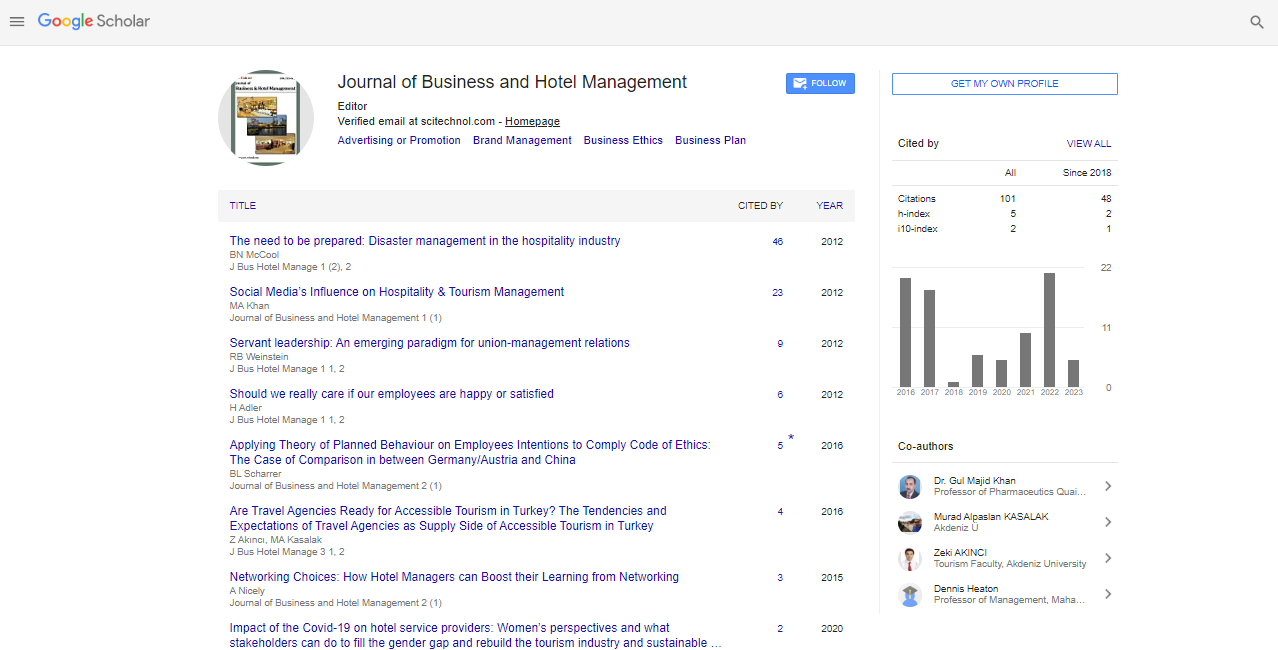Perspective, Jbhm Vol: 9 Issue: 3
Hotel Administration: The Art and Science of Hospitality Management
Menghini Howe*
Department of Business Administration, The Hong Kong Polytechnic University, 17 Science Museum Road, TST East, Kowloon, Hong Kong
*Corresponding Author: Menghini Howe
Department of Business Administration,
The Hong Kong Polytechnic University, 17 Science Museum Road, TST East,
Kowloon, Hong Kong
E-mail: Howehini458@gmail.com
Received date: 28 August, 2023, Manuscript No. JBHM-23-117769;
Editor assigned date: 30 August, 2023, PreQC No. JBHM-23-117769 (PQ);
Reviewed date: 13 September, 2023, QC No. JBHM-23-117769;
Revised date: 21 September, 2023, Manuscript No. JBHM-23-117769 (R);
Published date: 29 September, 2023, DOI: 10.4172/2324-9129.1000149
Citation: Howe M (2023) Hotel Administration: The Art and Science of Hospitality Management. JBHM 9:3.
Description
Hotel administration is a multifaceted discipline that combines artistry, precision, and business acumen to create seamless and memorable guest experiences. It encompasses a wide array of tasks, from managing guest reservations and ensuring exceptional customer service to overseeing finances and maintaining the overall operational efficiency of the establishment. In this essay, we will explore the intricate world of hotel administration, shedding light on its diverse components, challenges, and the skills required to succeed in this dynamic field.
Strategic planning and decision-making
At the heart of hotel administration lies strategic planning. Administrators are tasked with setting the overall direction of the hotel, defining objectives, and formulating policies that align with the organization's mission and vision. They make difficult decisions regarding pricing strategies, market positioning, and service offerings. These decisions not only impact the hotel's profitability but also shape the guest experience. Strategic foresight, market analysis, and a deep understanding of consumer behavior are essential skills for effective decision-making in hotel administration.
Guest experience and service excellence
Central to hotel administration is the relentless pursuit of guest satisfaction. Administrators must ensure that every guest receives unparalleled service from the moment they make a reservation to the time they check out. This involves training staff to be attentive, empathetic, and responsive to guest needs. Administrators create and maintain service standards, oversee staff performance, and implement guest feedback systems. Crafting a memorable guest experience involves attention to detail, anticipation of guest needs, and the ability to resolve challenges promptly and professionally.
Financial management and revenue optimization
Hotel administration requires a keen understanding of financial management principles. Administrators must develop budgets, manage expenses, and optimize revenue streams. They employ revenue management strategies to adjust room rates based on demand, market trends, and special events. Effective cost control, profit analysis, and forecasting are essential components of financial management in hotel administration. Administrators continuously evaluate the hotel's financial health, identifying areas for improvement and implementing measures to enhance profitability.
Human resource management and staff development
A important aspect of hotel administration is managing the diverse workforce that drives the hotel's operations. Administrators oversee recruitment, training, performance evaluation, and employee engagement initiatives. They foster a positive work culture, encouraging teamwork, motivation, and professional growth. Strong leadership, communication skills, and the ability to resolve interpersonal conflicts are vital in human resource management. Administrators empower their staff, recognizing that a satisfied and motivated team directly translates into exceptional guest experiences.
Operational efficiency and technology integration
Efficiency in operations is the backbone of successful hotel administration. Administrators optimize workflows, streamline processes, and implement technology solutions to enhance efficiency. They utilize property management systems, reservation platforms, and data analytics tools to monitor occupancy rates, track guest preferences, and analyze market trends. Technological integration not only improves operational efficiency but also enables personalized guest interactions, making the guest experience more convenient and enjoyable.
Conclusion
In conclusion, hotel administration is a dynamic and multifaceted discipline that demands a delicate balance between business acumen, creativity, and interpersonal skills. Administrators are the orchestrators of seamless guest experiences, the guardians of financial stability, and the driving force behind a hotel's success. Their ability to navigate the complexities of the hospitality industry, adapt to changing market trends, and foster a culture of excellence is what sets exceptional hotels apart. As the hospitality landscape continues to evolve, hotel administration remains at the forefront of innovation and guest-centric service. It is not merely a profession but an art form, where the canvas is the guest experience, and the strokes are the myriad elements that produce a masterpiece of hospitality. In the hands of skilled administrators, hotels transform from mere buildings into vibrant, welcoming spaces where every guest is not just a visitor but an integral part of an unforgettable journey.
 Spanish
Spanish  Chinese
Chinese  Russian
Russian  German
German  French
French  Japanese
Japanese  Portuguese
Portuguese  Hindi
Hindi 